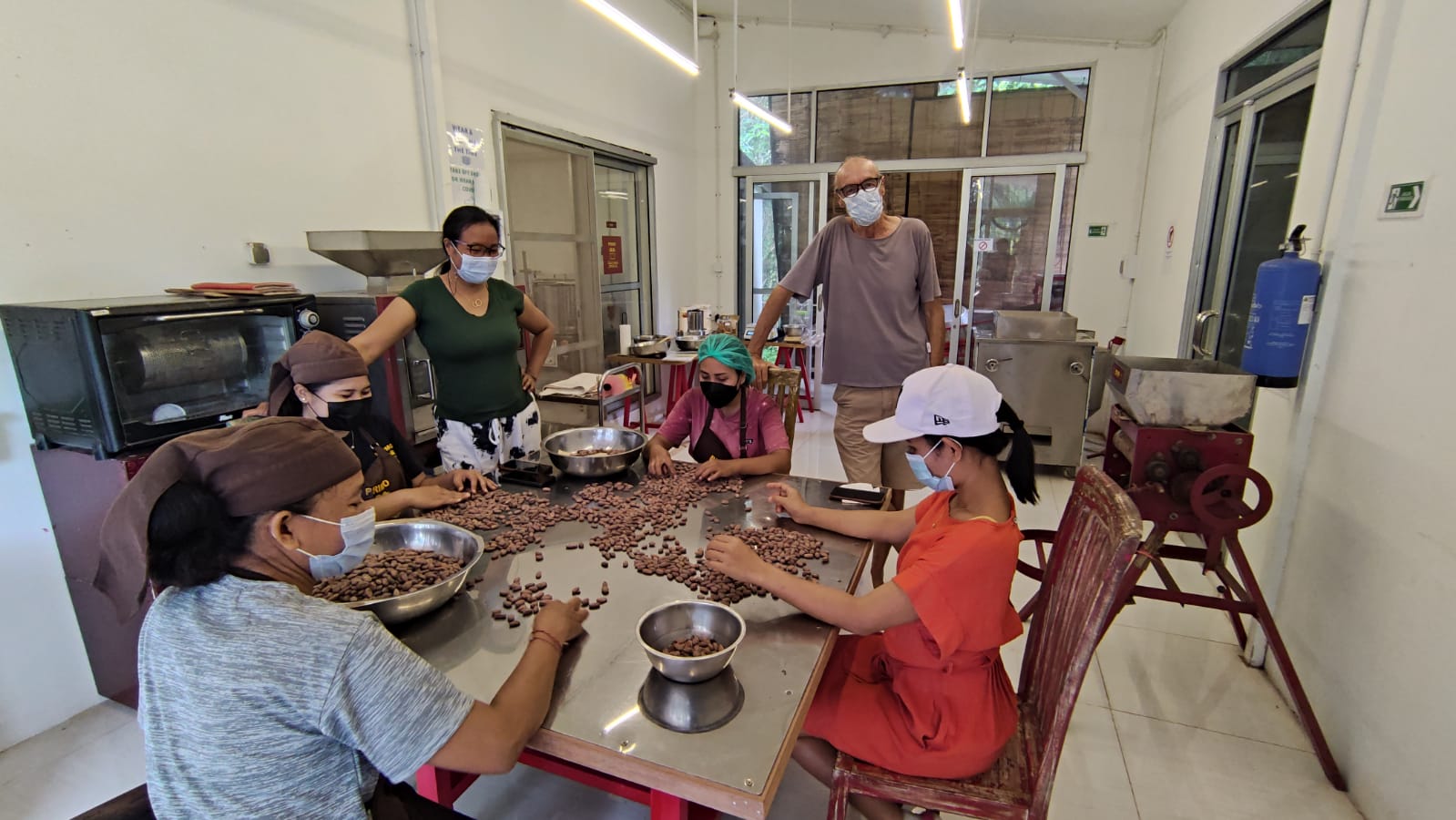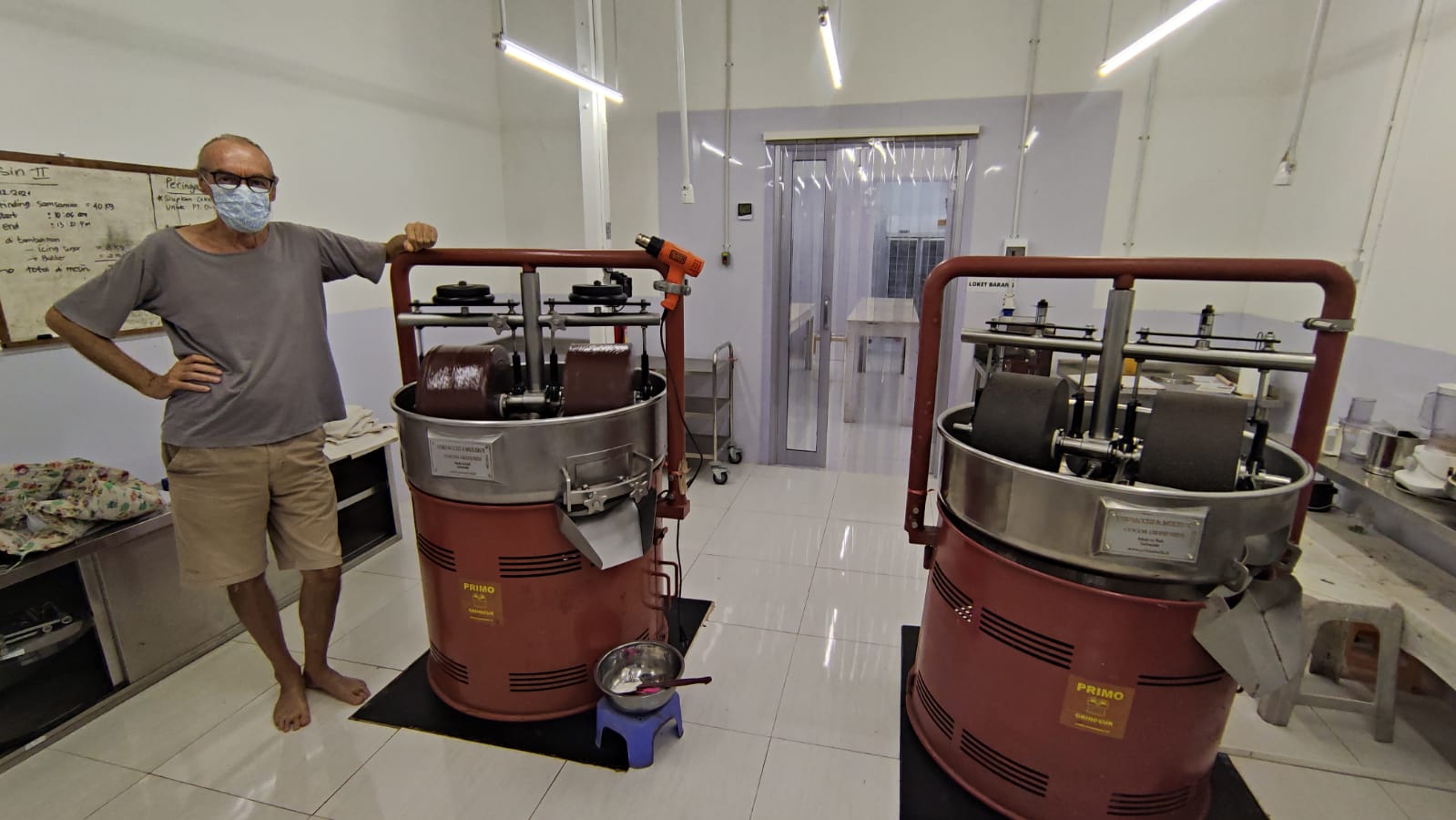
Yesterday, Paul and I visited Primo Chocolate, a top quality Italian Chocolate manufacturer based in Tabanan, Bali, where we discovered some interesting things about Chocolate.
I knew that cacao was pressed to make cocoa butter, leaving a residue of powder which becomes cacao powder. I didn't realise that this is the usual western way of getting rid of the goodness!
Cocoa butter is white, and is the normal produce of cacao factories in Indonesia, giving low returns for the farmer.
Primo Chocolate is different, and their method more impressive. First they take fermented cacao beans. The farmer ferments the beans by simply leaving them in a tall cone covered in banana leaves for a week, till there is a whiff of vinegar. Then it's time to dry the beans and remove the shell.
Primo Chocolate roast the beans, and then put them in a grinding machine. For 80 hours. Eighty! With slight pressure. This is the same process by which you make nut butters, like peanut butter. But a lot longer.

Primo Chocolate's Giuseppe Verdacci, with the self-made big grinders.
The result is a smooth dark Chocolate, to which they add extra ingredients according to the recipe. Powders, butters and oils. Water cannot be allowed in chocolate. Icing sugar, more cocoa butter, flavourings as essential oils in minute quantities.
Including vanilla.
The problem for them is that vanilla is rarely made into an essential oil, and when it is, very, very expensive. Fortunately, you only need a tiny amount. We do plan to make the essential oil, using steam distillation. So it is nice to know there is a market that will appreciate the high quality we produce.
We were also keen to know more about cacao, because one of our investors is keen for us to plant it. Certainly, it is a massive and increasing market, with China beginning to discover proper Chocolate.
Cacao doesn't grow well near our vanilla. The trees do fine, but the fruit always rots. It turns out that cacao does better at lower elevations, but it is tricky. The fruit is air pollinated, which means you can have a lot of unwanted hybridisation. There are two main varieties, like coffee, which revel with Inca names which I won't try to repeat. However, the flavour of the cacao changes with the soil, discernable differences from just a few kilometres apart.
We have access to a vast body of knowledge on growing cacao, and we also have access to huge tracts of land in Kalimantan and Sulawesi, possibly also Maluku. We would need huge tracts to make a go of it, because you can expect to earn Rp 75 million per hectare per year. That's nothing. Vanilla, we expect to bring in 2 billion per hectare.
So cacao stays on the back of our thoughts, waiting to see what the Chinese Market does.
Rex Sumner
Royal Spice Gardens is an Indonesian Foreign Investment Company, in Indonesia known as a Perusahaan Modal Asing (PMA).
NIB Licence number 0220100502286. NPWP: 94.830.504.0- 905.000.
PT Royal Spice Gardens Indonesia, Jl. Raya Pejeng, Tampaksiring, Gianyar, Bali 80552, Indonesia
Website by Simia Solutions / Cre8 Design Studio
Powered by Pak Kriss’s Compliance Framework.
Even in uncertain times, credible, stable & realistic opportunities are available for the astute investor.
Get the edge by obtaining clear, concise and rapid information. Fill out the form to receive our latest prospectus!